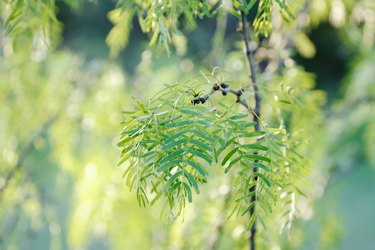
Mesquite trees (Prosopis spp.) are well adapted to dry climates, and established trees are resistant to drought. How much water does a tree need? During times of drought, plan to give your mesquite tree a deep watering about once per month. Depending on the species and cultivar, mesquite trees grow in U.S. Department of Agriculture plant hardiness zones 6 to 11.
Mesquite Tree Description
Video of the Day
Mesquite trees are commonly found in desert landscapes in the Southwestern United States. Some species you may encounter include the honey mesquite (Prosopis glandulosa, USDA zones 10-11), the screwbean mesquite (Prosopis pubescens, USDA zones 8-9) and the velvet mesquite (Prosopis velutina, USDA zones 9-11). All three of these deciduous trees have a rounded shape, although velvet mesquites may also have a vase shape.
Video of the Day
The trees have strong wood and small green leaves. In the spring, the tree has yellow blooms that develop into long legumes or seed pods.
These mesquite species grow up to 30 to 35 feet tall. How fast do mesquite trees grow? That can depend on the species and the amount of water the tree gets. The honey mesquite, for example, grows 12 to 36 inches per year. It grows faster when it gets plenty of water and slows its growth during times of drought.
How Often to Water a Mesquite Tree
When you plant a young tree, it is important to water it regularly for the first two months. This allows the tree time to establish roots. Check the soil daily and water as needed to keep the soil moist.
Once your mesquite is established, how much water does the tree need? In most cases, you don't need to water your mesquite at all, and rainfall is sufficient. However, if there is a drought or your tree is lacking vigor, deep watering is required.
Water the tree to a depth of 24 inches approximately one time per month if necessary. Drip irrigation is the best way to achieve this. Make sure you irrigate both inside and outside the drip line or the outside of the tree's canopy. You can check the soil to see how deep the water has penetrated by using a soil probe. Alternatively, use a long screwdriver or piece of rebar.
Mesquite Tree Desert Adaptations
The mesquite tree has several adaptations that allow it to thrive in dry environments. The mesquite roots grow in a way that allows them to absorb water even during times of drought. They have both long, lateral roots that can absorb water from near the soil's surface as well as a deep tap root.
The leaves of the plant are small. They have enough surface to perform photosynthesis, but their small size decreases the amount of water loss through the leaves. In addition, if there is a lack of water, the tree has adapted to drop its leaves and go into a dormant state.
In addition, the seeds have a low moisture content and can survive for more than 10 years and still be viable. This ensures the species will survive adverse drought conditions.
- Titan Tree Care: The Pros and Cons of Mesquite Trees
- Urban Forest Ecosystems Institute SelecTree: Honey Mesquite
- Urban Forest Ecosystems Institute SelecTree: Screwbean
- Urban Forest Ecosystems Institute SelecTree: Velvet Mesquite
- New Mexico Historic Sites: Mesquite
- Arizona Department of Water Resources: How Often and How Long to Water
- Action Yard & Tree Services: Essential Mesquite Tree Care Tips for Arizonians
- Arizona State University: Prosopis glandulosa